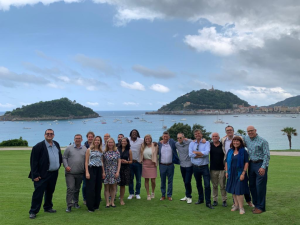Human rights have traditionally been associated with an idea of equality based on a model of homogeneity, neutrality and abstraction of differences. But this is a model that has been challenged from different perspectives, because it fails to recognise the special characteristics of the subjects. Many of today’s conflicts are a clear sign of this shortcoming. They express demands for recognition rather than redistribution. What the feminist issue and the equality issue, cultural rights, integration policies, demands for multinationality, for example, are calling for is that a more complex and more balanced idea of equality be formulated, an idea that is more in line with the genuine pluralism of our societies.
The project to make conditions equal by systematically putting all kinds of differences in brackets seems to have entered into a deep crisis. The traditional distinction between the public and private spheres aimed to shape a public sphere that was designed to function as a result of the renunciation by individuals of their identity by means of the public abstraction of identity. That was a model based on the preconception of thinking that to consider the other as equal, we were obliged to wipe the slate clean of what distinguished us from the one we regard as similar. This process of suppressing differences has undoubtedly been a factor in advancing the rift between society and the ancien regime, structured on the basis of codes of hierarchy and privileges. The differences undergo a moment of abstraction that becomes indispensable for us to regard ourselves as similar, above and beyond any context. But the problem is knowing whether this system is capable of handling the pluralism of contemporary societies. Everything points to the model having to be completed or transformed in order to address the challenges which, in the area of social and political integration, recognition and organisation of territorial balances, are posed by the new pluralism. The great challenge facing today’s world is how to organise coexistence in deeply plural societies while simultaneously avoiding the communitarist model and the model of the identity privatisation.
That the idea of abstract equality has no more to contribute is something that can be felt in the limited capacity for integration, which is becoming increasingly clear. Adherence to juridical and political principles does not suffice to ensure the cohesion of the social bond and to create the conditions of common ownership or shared citizenship. Historical experience insists on showing us that when the building of the State is carried out thinking that in order to advance towards that which is common, it is necessary to position oneself radically beyond differences, the result is that differences are expelled from the public sphere and one’s own is asserted against that which is common. Sooner or later public denial of that which distinguishes us ends up being perceived as a form of exclusion, in particular by those who regard the place assigned to them in the distribution of social opportunities or in the sharing of power as tantamount to inequality.
Demands for equality have recently taken an unexpected turn and require that we come up with a fresh formulation of equality that could be summarised thus: differences need to be assessed again in order to advance in the logic of equality. The same dynamic of democratisation that requires that equality be radicalised is the one that leads us to understand identity as politically and culturally distinct. We cannot put real differences in brackets if we want to recognise them on the footing, for example, of equality between men and women, or between members of cultural groups that assert their respective identities, or between communities with different aspirations to self-government. These are differences that have to be recognised on the basis of equality certainly, but without forgetting that they are differences.
We are facing a policy transformation demanded by the deepening of social pluralism. In today’s world there has been a great movement, which has to be taken into consideration, to shape such valuable realities like the common world, the public sphere, or laicity in order to integrate the differences within them and not simply neutralise them; it is not a question of eradicating them but of recognising them under a regime of equality. The biggest challenge facing contemporary societies consists of integrating the individual no longer through the privatisation of what belongs to him or her, but through the public recognition of his or her distinct identity, both from the point of view of gender, and from that of his or her cultural perspective or identification with a specific political community. This is the big dilemma we are facing, the question that is going to require of us greater efforts of imagination and political creativity in the years to come: making progress in extending rights by completing the step from the abstract universalism of political rights to the concrete universalism of social and cultural rights.



